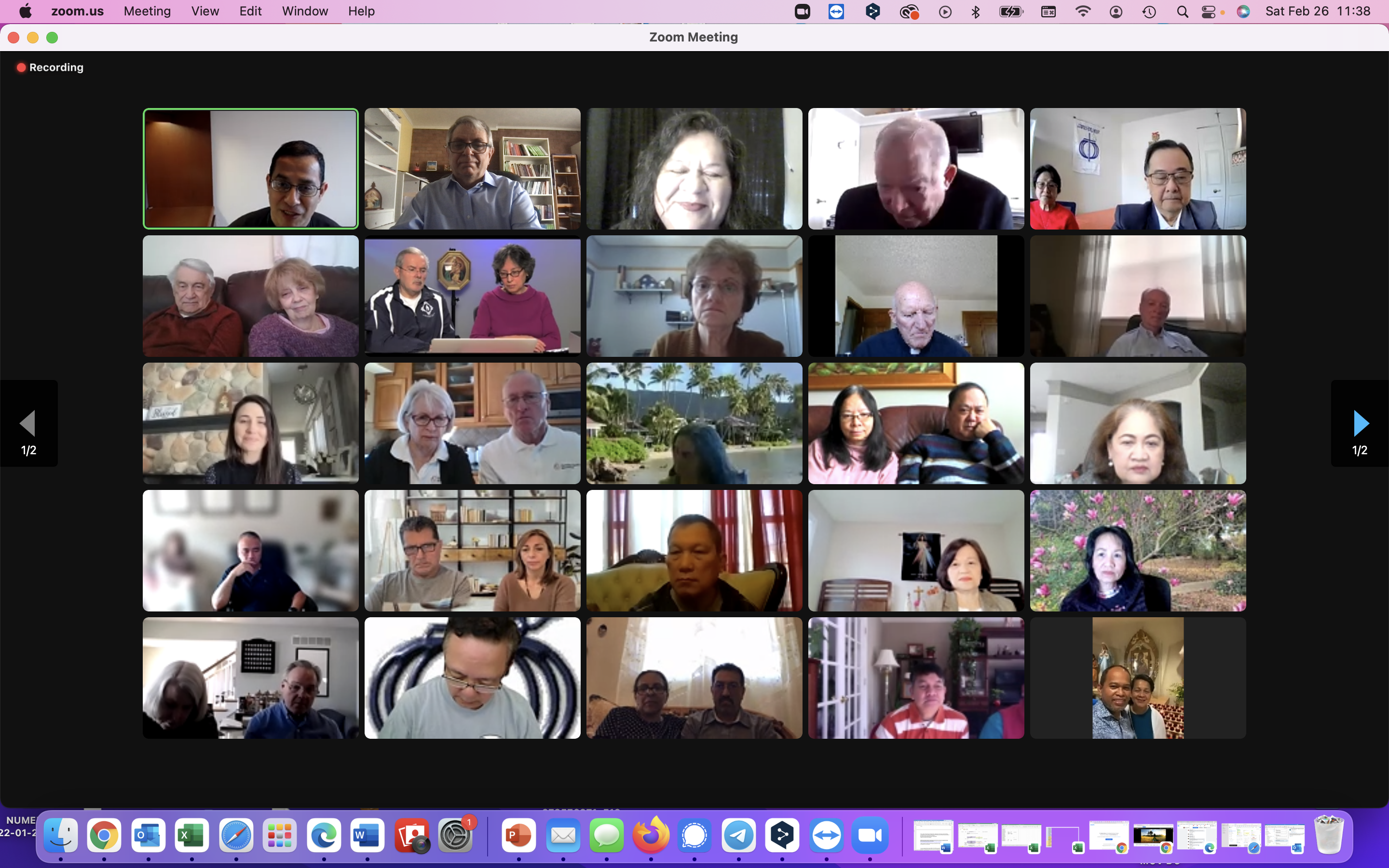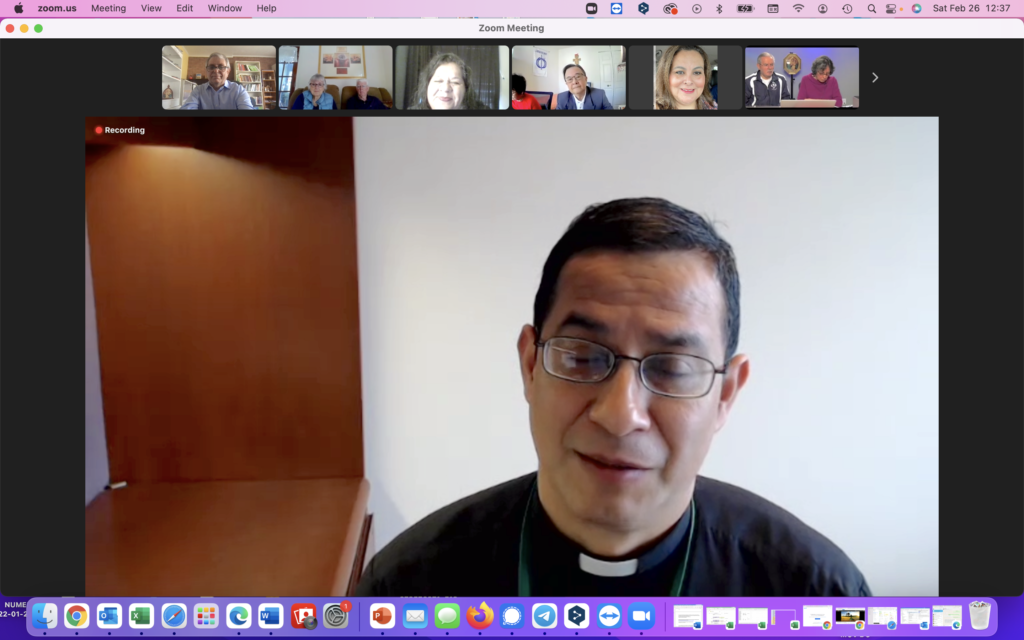
Representatives of 15 Movements and New Communities attended the 5th National Gathering organized by MovComUS, Catholic Ecclesial Movements and New Communities in the U.S. in Conversation.
Bishop Sam Jacobs, episcopal liaison, welcomed all participants and explained the history of MovComUS, its vision and mission, and gave a glimpse of what to expect for the day. He then introduced Bishop Andrew Cozzens, chair of the Committee of Evangelization and Catechesis, USCCB, and Fr. Jorge Torres, commissioned by Bishop Cozzens to promote the Eucharistic Revival at a national level; and the two sharers.
In his 26 minute video, Bishop Cozzens explained the raison d’etre of the USCCB initiative “Eucharistic Revival” that will be launched on June 10, 2022, Corpus Christi Sunday. He emphasized that the goal is to start a fire that will rekindle the love for the Holy Eucharist for individuals, parishes and communities, dioceses, and then the entire nation. A national Eucharistic Congress is being planned for July 17-21, 2024 in Indianapolis.
Bishop Cozzens explained that the initiative is not merely a reaction to the 2019 Pew Research that showed that less than 30% of Catholics believe in the real presence of Jesus in the Eucharist. It is a also response to the call of the New Evangelization for intentional disciples. He emphasized that the Movements and New Communities are a potent force in this endeavor because of their emphasis on individual renewal, transformation, and the empowerment of the Holy Spirit.
In the second half of his talk, Bishop Cozzens reiterated the importance of the faith that Jesus is alive and real in the Holy Eucharist and that all believers should encounter Him and be transformed by Him. He said that we should make our lives an offering /worship/ gift to the Father. Our imperfect self as offering becomes perfect when joined with Jesus.
Bishop Cozzens exhorted the participants to ponder the gift of the Holy Eucharist in our lives, and to listen to the Lord, asking ourselves how we can revive the love of the Eucharist by helping each other understand this mystery.

Fr. Jorge Torres, who has been appointed as a specialist at the Committee on Evangelization and Catechesis, explained his role to help in the organization and promotion of a national Eucharistic Revival, a part of the USCCB’s strategic plan, “Created Anew by the Body and Blood of Christ: Source of our Healing and Hope”.
Katie McGaver, of the Schoenstatt Movement, gave a powerful testimony on how in the dark night of illness she intimately encountered the merciful Love-Light of her Divine Physician. Divine Mercy became both her medicine and her calling. She now seeks to radiate His Love-Light forth with her life as a beacon of hope to others amid times of darkness through
BetheLightofChrist.Org is a forum she fondly calls “a love-letter to the Lord with my life.”
The McGavers and others at their parish brought to light IGNITE – an evening of inter-generational adoration, praise & worship music, seeking to ignite hearts on fire for Christ.
Alan Alameida, of the NeoCatechumenal Way, is an immigrant from Brazil. Alan shared about the pains of having an alcoholic father and the joy of being welcomed and accepted in a community of believers that made him closer to God through the Holy Eucharist.
The participants were grouped into 8 small groups of 5-7 members each. Here is a sample report from one group:
“Our discussion group (composed of representatives from Schoenstatt Movement, Sword of the Spirit and Couples for Christ), shared on what the Holy Eucharist means for each one, i.e. being united with Jesus. We exchanged ideas on how, individually, we intend to share our love for the Eucharist to our family, friends, parish, and movements/communities. The group loved CFC-USA battle cry “Pray HARDER” – acronym for Holy Hour, Adoration, Reconciliation (Confession), Divine Mercy, Eucharist (Mass) and Rosary”
The moderator encouraged participants to ask questions thought the Zoom Chat Box, using the “raise hand” icon or simply requesting to speak.
Here are sample questions and responses from the Chat Box:
Fr. Jorge, how can this group support the Revival in a very practical level?
What is the expectation from the USCCB about the involvement of the movements and new communities in the Eucharistic Revival in a local and in a national level? Thanks. Blessings!
From Father Jorge Torres: Here are some questions that can help the process. Each movement will discern the level of involvement.
1. Foster encounters with Jesus through kerygmatic proclamation and experiences of Eucharistic devotion.
2. Contemplate and proclaim the doctrine of the Real Presence of Jesus in the Eucharist through the Truth of our teaching, Beauty of our worship, and Goodness of our accompaniment of persons in poverty and those who are vulnerable.
3. Empower grassroots creativity by partnering with movements, apostolates, parishes, and educational institutions.
4. Reach the smallest unit: parish small groups and families.
5. Embrace and learn from the various rich intercultural Eucharistic traditions. – Does your organization have any existing?
Apostolic Movements can discuss and discern the following: Eucharistic Revival through prayer support or catechesis?
1. Do you have any conferences or events coming up that could turn its focus toward the Eucharist? Would you let us know if you decide to do such?
2. Do you have any best practices in advancing Eucharistic Catechesis to share?
Comment: One answer to one of your questions, Fr. Jorge. In Couples for Christ we have introduced our Explaining our Catholic Faith teaching series. Last year we had 4 national teaching sessions where we invited prominent speakers to talk about our Church’s teachings. Our first session was about the Real Presence, with Fr. Cris Alar , MIC , delivering the teaching virtually.
Question: How can the Church address professors in Catholic Universities that share in their class views that are not grounded on Catholic teachings?
From Father Jorge Torres: Your bishop is the one who can address individual concerns about a professor.
Sample Questions and Comments from the Floor:
Fr. Torres was asked how his involvement in this new initiative affected his life especially as a priest.
A participant raised concern about the need for parents to step forward and catechize their children who are bombarded by false claims in social media and aggravated by absence of teaching especially in public schools.
Another concern is that parents themselves need to be catechized.
This is one area where Movements and New Communities can help.
Fr. Brian McWeeney, liaison with MovCom of New York, commented on the importance of role of priests.
Fr Jorge informed the group that a study by CARA, among other initiatives and action plans, will help determine what the best strategy to equip parents is.
Moving Forward/ for Discernment of Movements and New Communities:
From Bishop Cozzens:
1. Vatican II taught that the Eucharist is the Source and Summit of our lives, what are the reasons that 50 years after Vatican II we find ourselves in a crisis about Eucharistic faith in the Church?
2. How is the Eucharist the source and summit of the evangelistic mission of the Church to reach those who don’t yet know Jesus as Lord?
3. How can I increase my relationship with Jesus in the Eucharist to learn to live daily a Eucharistic life, as Pope Benedict said, “Christianity’s new worship includes and transfigures every aspect of life: ‘Whether you eat or drink, or whatever you do, do all to the glory of God’ (1 Cor 10:31). Christians, in all their actions, are called to offer true worship to God. Here the intrinsically Eucharistic nature of Christian life begins to take shape. The Eucharist, since it embraces the concrete, everyday existence of the believer, makes possible, day by day, the progressive transfiguration of all those called by grace to reflect the image of the Son of God (cf. Rom 8:29ff.)…. There is nothing authentically human – our thoughts and affections, our words and deeds – that does not find in the sacrament of the Eucharist the form it needs to be lived to the full” (Sacramentum Caritatis, 71).
From Fr. Jorge Torres
1. Do you desire to be involved with the Eucharistic Revival through prayer support or catechesis?
2. Do you have any conferences or events coming up that could turn its focus toward the Eucharist? Would you let us know if you decide to do such?
3. Do you have any best practices in advancing Eucharistic Catechesis to share?